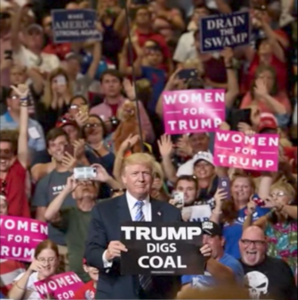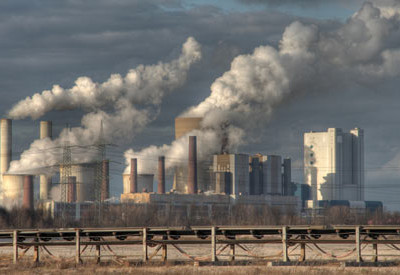The US’s Departure from the Paris Climate Agreement is Not Such a Big Deal
The impacts of Pres. Trump’s action will be symbolic, not substantive

Soon after entering office, President Donald Trump promised to withdraw the United States from the Paris climate agreement. He did so yesterday, which was the first day that he may. This is unfortunate but not as great a tragedy as it might appear, at least substantively. This is because both of the Agreement’s content and of how climate action operates.
First, in terms of the Agreement, recall that President Obama was able to secure America’s participation without ratification by the Senate. That body would have rejected the Paris Agreement, even though ratification is required for treaties. Although the Agreement is a treaty in international law [PDF], negotiators carefully crafted it so that it would be seen in US law as merely an elaboration of an existing treaty, the 1992 UN Framework Convention on Climate Change. This way, Pres. Obama could both sign and effectively “ratify” it himself, analogous to an executive order. While this arrangement created a relatively low bar for President Obama to get the US into the Agreement, it did the same for President Trump to get out. And the arrangement also means that a future (presumably Democratic) president could simply join the Agreement once again. Indeed, it now seems likely that future American participation will be a partisan pendulum that swings with the presidency.
Second, with respect to greenhouse gases, the Paris Agreement does not require participating countries to reduce emissions by specific amounts. Instead, they announce every five years how they intend to cut emissions. These “nationally determined contributions” (NDCs) are not binding under international law; countries must merely issue them every five years, and each one must be a step further then the prior one. Thus, in principle, President Trump could have stayed in the Agreement, made little effort to stay on track to meet the US’s 2015 NDC, and then issued one in 2020 that was only slightly more ambitious. Likewise, without US participation in the Agreement, a new president could announce an NDC-like greenhouse gas emissions target as if the US were a party to the Agreement.
Third, US businesses, cities, and especially states can continue to develop and implement policies to reduce emissions, just as they have done since the George W. Bush administration. California — which as a country would rank as the world’s fifth largest economy — has led in this regard before, and Governor Gavin Newsom intends to continue.
Finally, climate policy does not actually have that large of an impact on emissions. Other factors — especially population growth, economic development, and technological innovation — matter more. The US currently accounts for only 13% of global emissions; a slight shift in its trajectory one way or the other will have little impact on total global emissions and atmospheric concentrations, which ultimately determine the magnitude of climate change.
At the same time, Pres. Trump’s withdrawal from the Paris agreement does matter politically. Emissions cuts is a global collective action problem, in which the group would be better off taking action but each member is individually better off by not doing so. No one wants to be the one that does much more than the others, so international trust is essential. As other countries prepare their second round of NDCs, which are due in one year, they will see that the world’s superpower, wealthiest country, and greatest historical emitter lacks ambition. In response, they are likely to dial back their own.
However, there may be hope for those of us concerned about climate change and the direction of US policy. The international meeting where countries will finalize their NDCs will happen soon after the 2020 US presidential election. A president-elect could announce his or her intention to ramp up American climate change policy upon coming into office, and other countries might respond accordingly.
Reader Comments
One Reply to “The US’s Departure from the Paris Climate Agreement is Not Such a Big Deal”
Comments are closed.







Very insightful perspectives here.
I think technological innovation gets too little recognition for climate emissions. Without continuously cheaper wind and solar power, renewable portfolio standards couldn’t exist. Without Tesla showing automakers how to make ZEVs, we’d have no hope of stopping Big Oil. Etc.
But the big untapped story is the co-benefits of decarbonization. The IMF has for years tracked fossil fuel “subsidies”, which include lots of externalized costs, reporting that “About three quarters of global [fossil fuel] subsidies are due to domestic factors—energy pricing reform thus remains largely in countries’ own national interest…”
https://www.imf.org/en/Publications/WP/Issues/2019/05/02/Global-Fossil-Fuel-Subsidies-Remain-Large-An-Update-Based-on-Country-Level-Estimates-46509
In other words, the social costs of GHG emissions are far less than all the other economic and socialized costs of fossil fuels. There are overwhelming local cost savings from adopting clean energy technologies, particularly ZEVs.
The Koch Network now teaches us that cleaning up dirty infrastructure is unaffordable. But guess what–we’re buying new cars all the time, and ZEV prices plus a few years of fuel have already crossed price parity vs gasoline/diesel light vehicles. The average light-duty vehicle in America switched to a ZEV will save about $1200 a year just on fuel, so consumer savings will soon skyrocket while auto capital spending simply shifts from gas guzzlers to ZEVs.